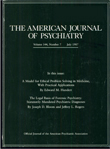No Association Between Novelty Seeking and the Type 4 Dopamine Receptor Gene (DRD4) in Two New Zealand Samples
Abstract
OBJECTIVE: In 1986 and 1987, Cloninger postulated the existence of the heritable behavioral trait of novelty seeking and its putative underpinnings in the dopaminergic systems of the ventral midbrain. Two widely reported studies found significant associations between novelty seeking and the type 4 dopamine receptor gene (DRD4), although a more recent study did not. The authors' objective was to investigate this association in two New Zealand samples. METHOD: The authors studied two nonoverlapping samples: subjects in a depression treatment trial (N=86) and subjects from 14 pedigrees dense with alcoholism (N=181). DRD4 genotyping was based on a standard protocol. RESULTS: Novelty seeking and DRD4 were not statistically associated. CONCLUSIONS: In these samples, there was no suggestion that the DRD4 polymorphism contributed to individual differences in the behavioral trait of novelty seeking. (Am J Psychiatry 1998; 155:98–101)



